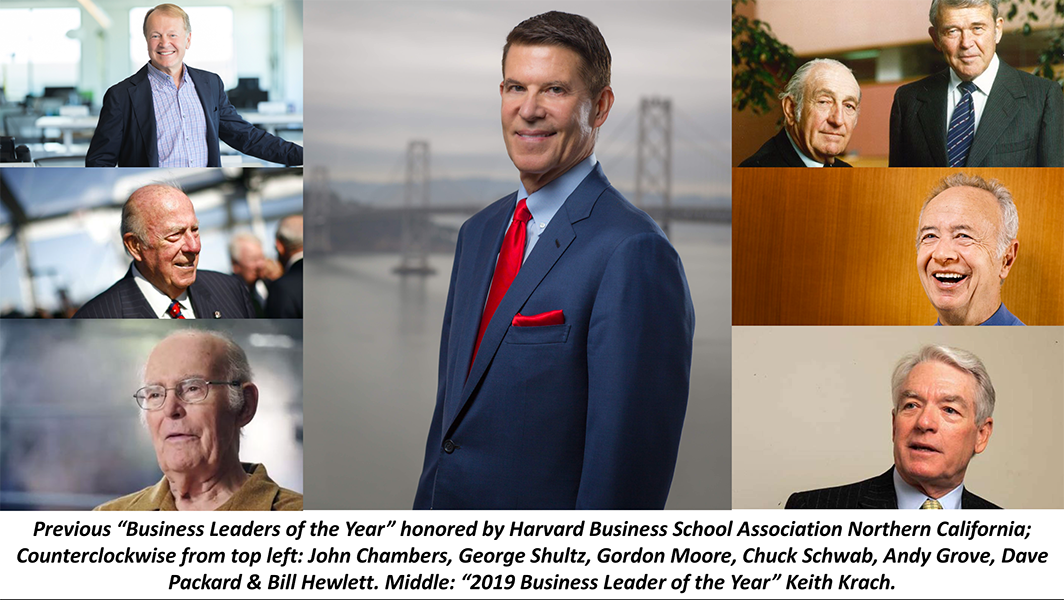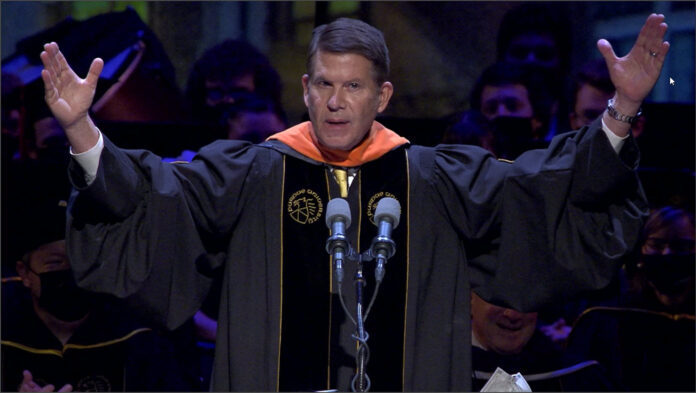

A Four article series Highlighting
Transformation to the Power of Trust, The Center for Tech Diplomacy at Purdue and the Global Economic Security Strategy >> First >> Second >> Third >> Final
Under Secretary of State Krach tells grads, “The world needs more trusted transformational leaders than ever before,” in inspiring commencement address.
At Purdue University’s commencement ceremonies on Dec. 18, former Under Secretary of State Keith Krach and Life & News’ “2018 Transformational Leader of the Year” told grads the world needs more trusted transformational leaders than ever before in an inspiring commencement address to the graduates of his alma mater.
A Joyful Homecoming
For the former International President of the Sigma Chi Fraternity, it was a joyful homecoming. Ever since graduating with a degree in Engineering in 1979 on a General Motors scholarship, Krach has been actively engaged with the university, which he described to graduates as their “forever friend.”
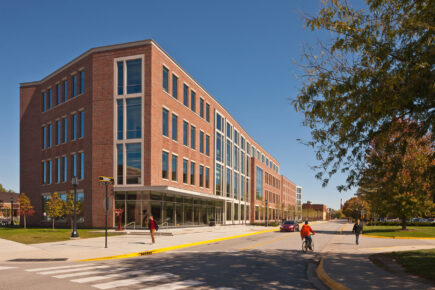
He served as Chairman of Purdue’s Board of Trustees from 2007-2013 where he recruited the sitting Governor of Indiana, Mitch Daniels, to become Purdue’s 12th President. In 2014, the Krach Leadership Center opened and was named in his honor. After Krach’s service to the country he co-founded Purdue’s Center for Tech Diplomacy in the fall of 2021 with Engineering Dean Mung Chiang, who he recruited to be his Science and Technology Adviser for the US Department of State.
Transformational Impact
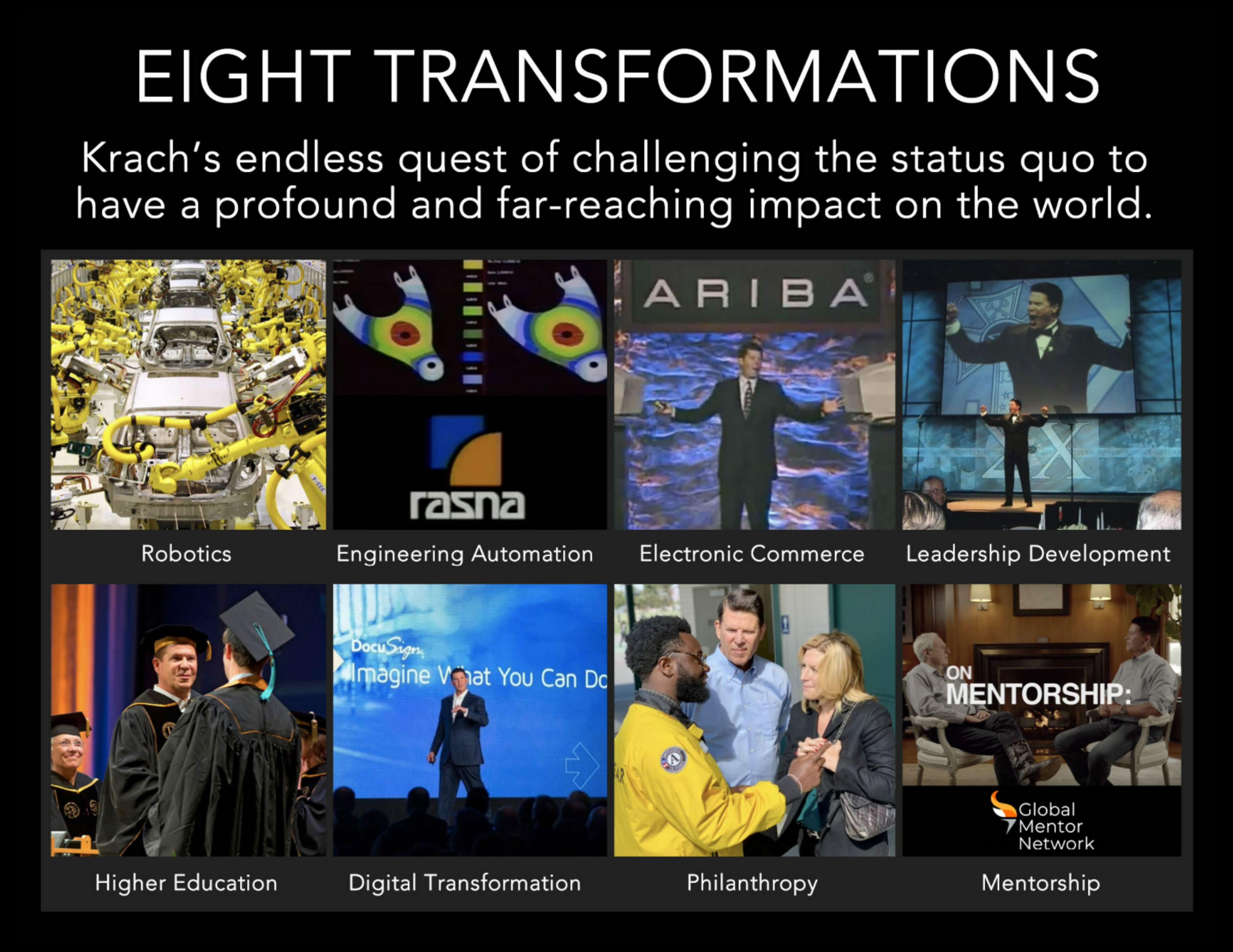
President Daniels’ introduction spotlighted the impact of Krach’s multi-sector transformational leadership. According to Daniels, “Keith’s career is a story of one giant leap after another focused on creating value and improving the ways in which we all live and work.” Daniels said Krach is, “An American businessman, a Silicon Valley innovator, a philanthropist, and a public servant noted for bringing transformational leadership in realm after realm—robotics, engineering, commerce, education, philanthropy, government and even the way people sign documents.” Daniels noted that, “On top of all these accomplishments, including having the rare distinction of being unanimously confirmed by the U.S. Senate, he’s remained dedicated to giving back generously, founding and leading several foundations and other philanthropic organizations.”
Purdue your “Forever Friend”
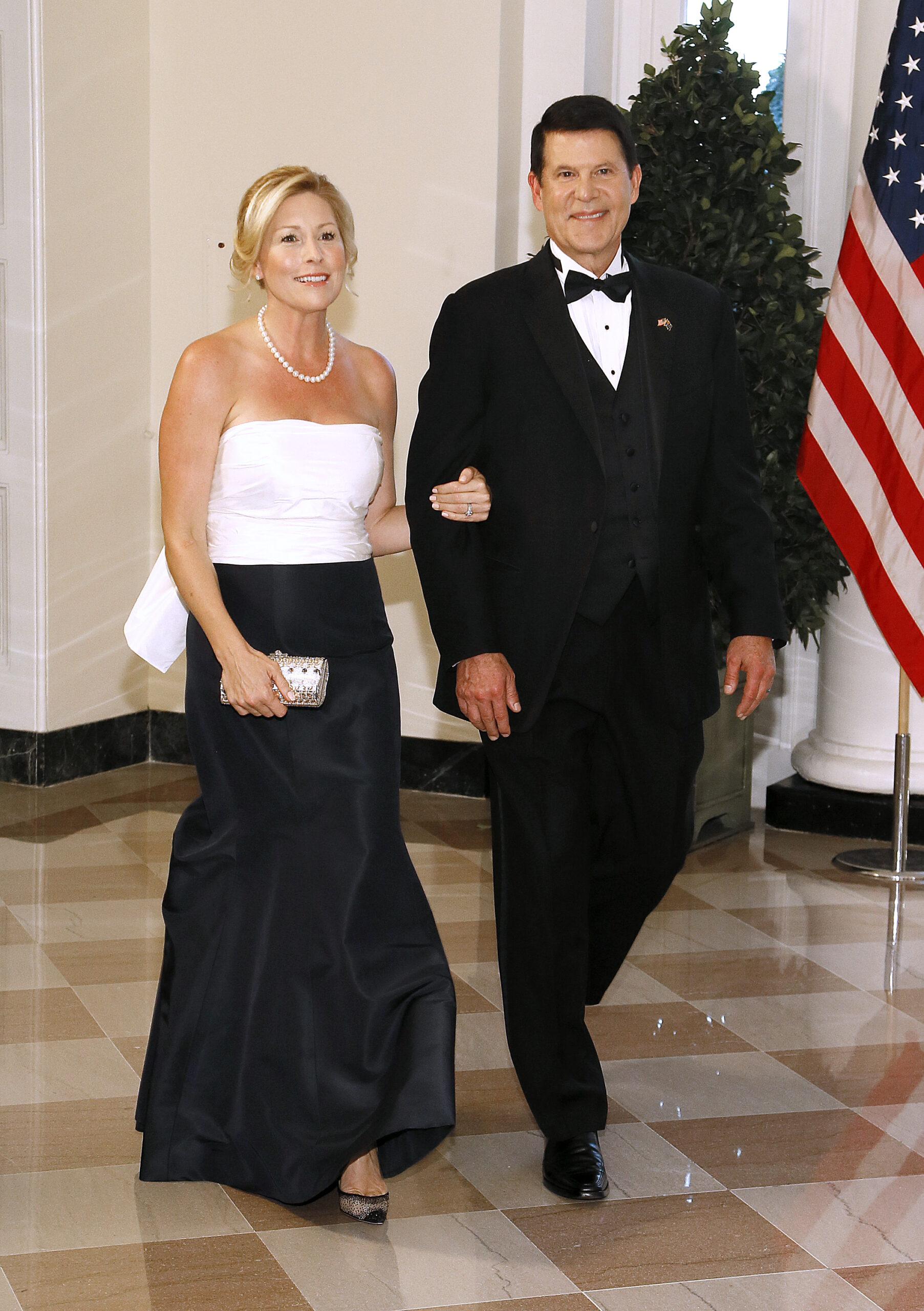
As Krach began his address, he noted that, “While I’ve had a long career since I left Purdue, it feels like I was just sitting exactly where you are now, wondering what my future would be like. I also remember how excited and blessed I felt. My family, like so many of yours, had sacrificed a great deal for me to come here. However, since then, that blessed feeling has grown ten-fold. I can tell you after four decades of being an alum: Purdue is your forever friend.”
Krach thought that Kahlil Gibran summed up that Purdue friendship best: “When you part from your friend, you grieve not; for that which you love most in him may be clearer in his absence, as the mountain to the climber is clearer from the plain.”
Krach said, “As an undergrad, this mountain climber learned a lot of lessons here at Purdue. Let me share the most significant one. I didn’t realize it at the time, but I now see it with tremendous clarity from the plain. It’s about two words: Transformation, and Trust.”
Proof of the “T2” Equation
Being an engineer, Krach couldn’t resist turning it into a single equation for the grads: Transformation to the power of Trust or simply T2, which he reverently calls “the Purdue Equation.” This highly educated crowd knew that any mathematical equation can be shown to be true by using a thing called a proof. So Krach shared his personal proof for the T2 equation.
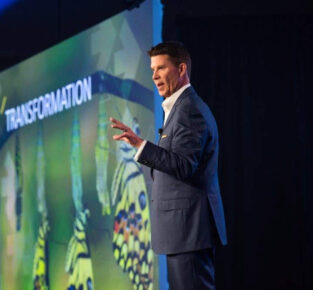
He began with Transformation. “Transformation is the most powerful word in any language,” Krach argued, “because without it we don’t develop, prosper, or grow.”
Krach recalled working as a welder at the age of 12 in his dad’s 5-person machine shop. In good times, his father employed five workers—in tough times, he was his only employee. His father encouraged him to get some “college knowledge,” and come back as an engineer to help him grow the business into a “big company” of 10 employees. Krach confessed that while he did become an engineer, he never went back to work with his dad.
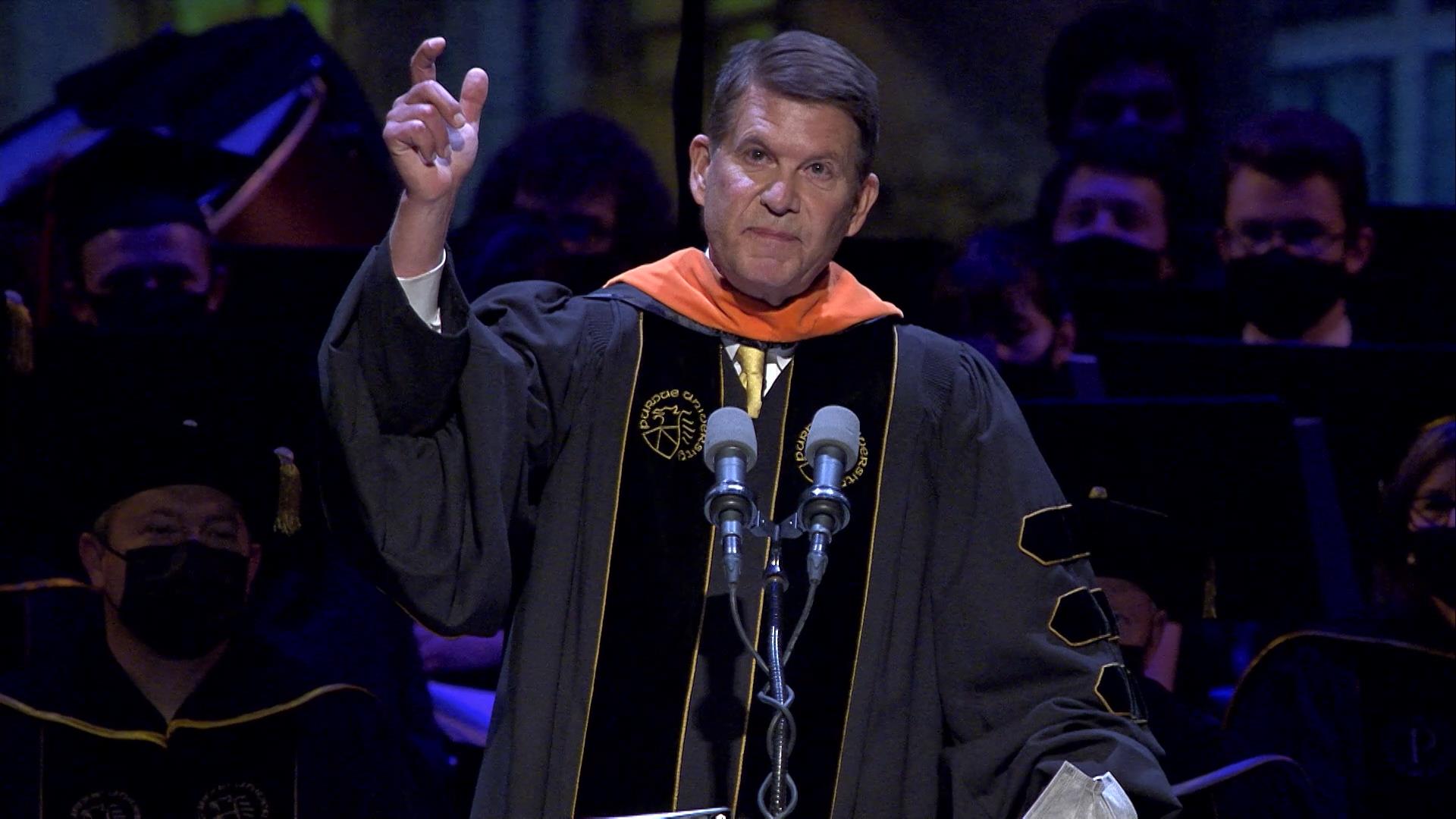
He said, “But my dad was proud I was a Boilermaker and loved the fact that it was also the name of his favorite after-work adult beverage.” After the grads finished laughing, Krach acted as if he was toasting his father with his dad’s favorite after-work adult beverage, a Boilermaker. “Here’s to you pops!” he said.
Jumping in Water Over Your Head
For Krach, attending Purdue was “jumping in water over my head.” He was terrified he would never make it as an engineer. He recalled feeling outgunned because he never took “those fancy high school classes” that his classmates had taken. According to Krach, “it took all the courage I could muster to challenge my status quo.”
He urged the graduates to “jump in water over your head,” and trust themselves to survive, thrive, and grow. This is the key to personal transformation, Krach said. Jumping in the deep waters of Purdue, “was a great lesson in transformation and trusting myself,” Krach said. “I have Purdue to thank for that little voice in my head that tells me to go for it, and I’ve been doing it non-stop my whole life.”
“Scary Fun”
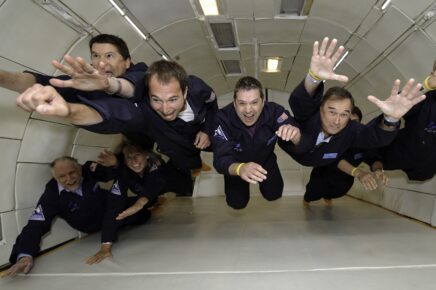
Krach pointed out that his life’s transformational journey has been at high velocity with plenty of adversity. He admitted that “living on the edge” of his capabilities gave him many opportunities to fail, but these have always been the times when he learned the most. Each new chapter builds on the last one and involves the risk of jumping in water over your head. Krach said, “After a while, that adrenaline rush becomes so addicting, that I can’t imagine living without it. I call it scary fun.”
Krach then tipped his hat to Purdue’s President, quoting Daniels’ commencement address from the previous year: “the biggest risk of all is that we stop taking risks at all.” Then he said, “And that’s why the Wall Street Journal calls Mitch Daniels the most innovative university president in America!”
Krach explained that his willingness to engage in constant personal transformation empowered him to spearhead the creation of numerous game-changing companies that created entirely new categories in multiple industries. Krach asserted, “If your company isn’t transforming, it’s dying—and the best way to control the future is to invent it.”
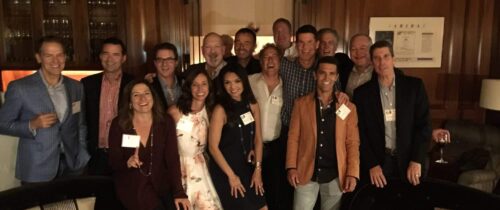
High Performance Teams
Krach’s life’s work has been focused on creating innovative companies, and he believes diversity of thought is the catalyst for genius—the secret sauce for building high-performance teams. He has used this approach—distilled into a “Business Playbook”—to drive a repeatable pattern of success in organization after organization.
When Harvard Business School named Krach their 2019 Business Leader of the Year, former faculty HBS chair and Purdue Alum Bruce Harreld observed, “All four of Krach’s companies are considered disruptors that transformed industries and generated significant shareholder value by becoming the clear market leaders through category creation.”
Essential Ingredient: Trust
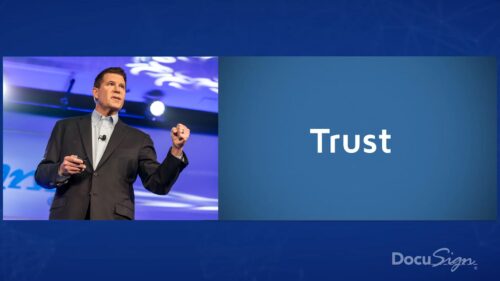
Krach declared the essential ingredient to building such companies with high-performance teams is Trust, which led to the second element of the T2 equation. “If ‘Transformation’ is the most powerful word in any language, then TRUST is the most important word,” Krach told the graduates. “And when you take Transformation to the power of Trust, that’s when the T2 magic happens.”
Krach emphasized for the graduates that whenever you’re starting companies from scratch, people have to Trust you, your product, your processes, and your company. Krach’s proof included even changing the way people have been signing for thousands of years. For 10 years he would stand on stage and tell DocuSign employees, “We’re not in the software business, we’re in the trust business. We deal with people’s most important documents. Those are the ones that you sign.” Trust is the basis of every relationship—business, personal, or otherwise. You do business with people you TRUST. You partner with people you TRUST. You buy from people you TRUST. You love people you TRUST.”
Krach pointed out that this applies to the global stage as well. However, as he discovered, the world has some authoritarian leaders who are diametrically opposed to trust on a massive global scale.
Mr. Krach Goes to Washington
Krach confided, “This Ohio boy began his journey welding parts, and later had the good fortune of welding together billion-dollar companies. But even this dreamer could have never imagined that someday he would be called upon to run US economic diplomacy and have the opportunity to give back to this great nation which has given so much to him and his family.”
His charge was to develop and execute a Global Economic Security Strategy that drives economic growth, maximizes national security, and combats economic aggression. “I was jumping in some deep water,” he admitted. “As a lifelong businessman, it was no small risk on my part to leave my world in Silicon Valley to serve in government.” He added with a twinkle in his eye, “But it turned out to be the most rewarding risk I’ve ever taken…so far.”
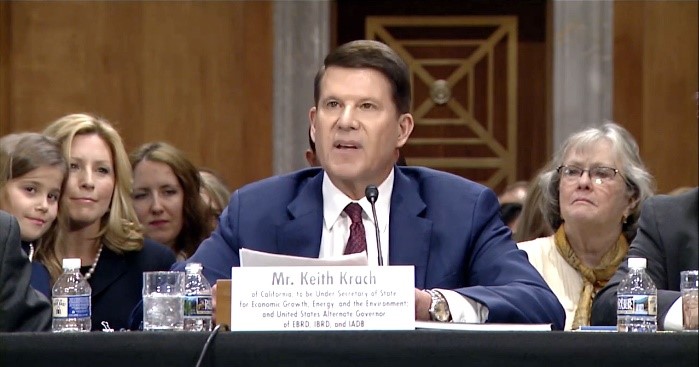
In Krach’s Senate confirmation hearing, he described the nature of his challenge: “I fully appreciate the enormity and gravity of this role. The reality we face as a nation is one of ever-increasing cyber warfare and seemingly ceaseless variations of intense, even weaponized economic competition. Our rivals are playing the long game and they are playing for keeps—a four-dimensional game of economic, military, diplomatic and cultural chess with little respect for human rights, intellectual property, international law, transparency, the environment, or the sovereignty of other nations. To prevail, we must play this game better and take economic statecraft to the next level.”
The Urgent Mission
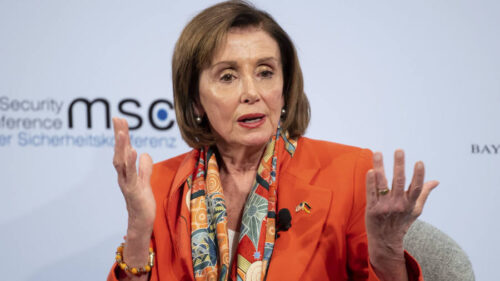
Krach described to the graduates one of his most urgent missions: defeating an authoritarian regime’s masterplan to control global 5G communications. “Their momentum seemed unstoppable, and it seemed inevitable. Politicians on both sides of the aisle were hitting the panic button,” he observed.
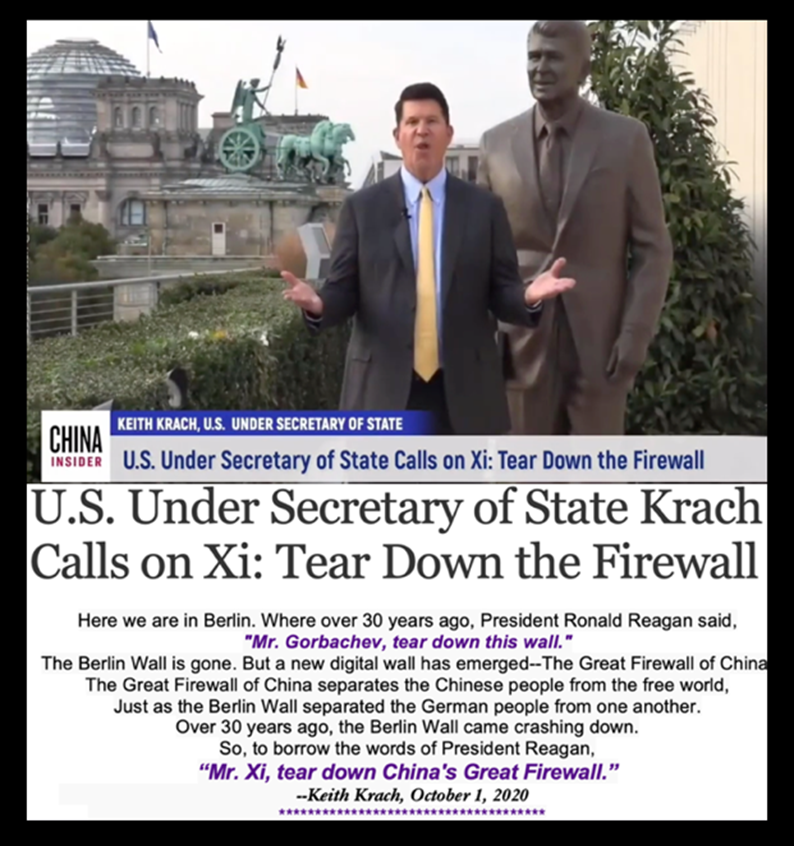 In all likelihood, Krach was referring to the Chinese Communist Party (CCP)—though he refrained from specifically referring to them during the speech. Their infiltration of global communications threatened not just telecom, but every form of current and upcoming technology that depends on wireless data: autonomous cars, power plants, electrical grids, manufacturing and sanitation facilities, medical technology, etc. In short, all the systems modern societies depend on to survive and thrive. Had their expansion continued unchecked, countries around the world would have literally been at Beijing’s mercy. The situation was urgent; the problem was enormous; and the stakes were higher than they had ever been between the two countries.
In all likelihood, Krach was referring to the Chinese Communist Party (CCP)—though he refrained from specifically referring to them during the speech. Their infiltration of global communications threatened not just telecom, but every form of current and upcoming technology that depends on wireless data: autonomous cars, power plants, electrical grids, manufacturing and sanitation facilities, medical technology, etc. In short, all the systems modern societies depend on to survive and thrive. Had their expansion continued unchecked, countries around the world would have literally been at Beijing’s mercy. The situation was urgent; the problem was enormous; and the stakes were higher than they had ever been between the two countries.
The “Aha!” Moment
Krach recounted for the graduates his “aha!” moment in creating the strategy that defeated Huawei—talking with his foreign counterparts about their relationships with the “regime,” and being told again and again, “We don’t trust them!”
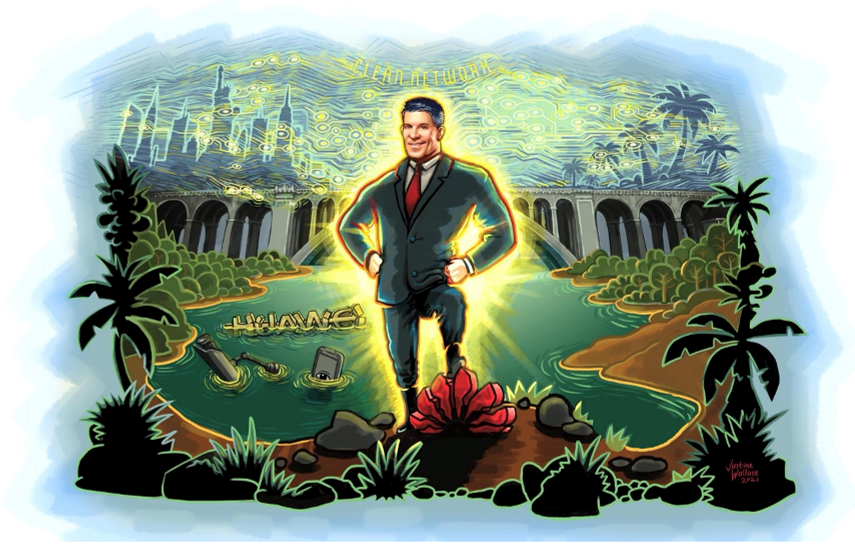
That’s when Krach and his team made Trust the core of their strategy and built the Clean Network alliance of countries and companies, which operate by a set trust principles like integrity, transparency, reciprocity, and respect for human rights, rule of law, property, national sovereignty, and the environment.
“All those things together equal TRUST,” Krach emphasized. “These are things honored in the free world, and authoritarian regimes do not. They actually use them against us for their strategic advantage. In one jiu-jitsu move, we turned the tables and used those principles we call freedom against them.”
HBS Case Study
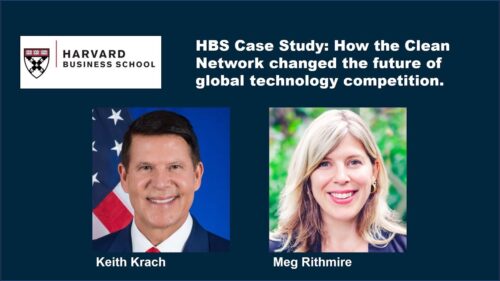
Based on a recent HBS case study about his efforts at the State Department, “The Clean Network and the Future of Global Technology Competition,” Krach believed the same leadership principles and strategies he used so effectively in building category kings and massive networks could be applied to economic statecraft. The team’s strategic imperative was to reverse the CCP’s momentum and replace it with our own momentum by de-positioning the regime through their greatest weakness: their lack of Trust. The objective was to defeat the CCP’s masterplan and use 5G as beachhead to deliver a proven, repeatable, and enduring model for competing against China, Inc. across all sectors, since they all pose similar challenges.
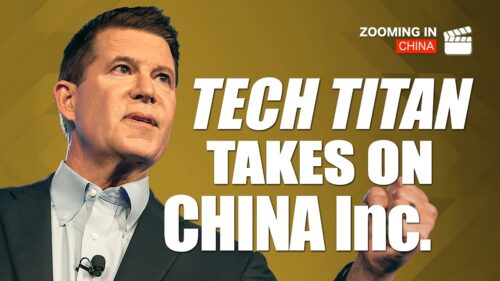 As dramatized in a two-part documentary “The American Dream Takes on China Inc.,” despite being built in the midst of the worst pandemic in a century, the network quickly grew to include 60 countries, hundreds of tech companies, and two-thirds of global GDP. Huawei went from 91 contacts down to barely two dozen. The CCP’s 5G master plan had been thwarted, and for the first time, they had been soundly defeated by a US government-led initiative, proving that China, Inc. is beatable by exposing their biggest weakness, which is lack of Trust.
As dramatized in a two-part documentary “The American Dream Takes on China Inc.,” despite being built in the midst of the worst pandemic in a century, the network quickly grew to include 60 countries, hundreds of tech companies, and two-thirds of global GDP. Huawei went from 91 contacts down to barely two dozen. The CCP’s 5G master plan had been thwarted, and for the first time, they had been soundly defeated by a US government-led initiative, proving that China, Inc. is beatable by exposing their biggest weakness, which is lack of Trust.
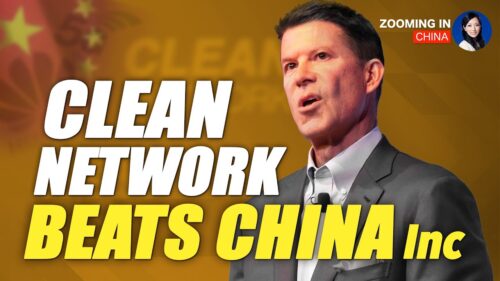 According to Bloomberg, “The Clean Network’s effort to create a united economic front is to China what George Kennan’s “long telegram” of 1946 was to the Soviet Union. Kennan is considered by the State Department as the father of modern foreign policy who formulated the Cold War strategy of containment.”
According to Bloomberg, “The Clean Network’s effort to create a united economic front is to China what George Kennan’s “long telegram” of 1946 was to the Soviet Union. Kennan is considered by the State Department as the father of modern foreign policy who formulated the Cold War strategy of containment.”
Transformational Diplomacy: Tech-Statecraft
One of their greatest accomplishments, Krach said, was the creation of a “new form of transformational diplomacy based on trust that integrates Silicon Valley strategies with traditional foreign policy tools which is now known as Tech-Statecraft.”
“Perhaps most importantly,” Krach emphasized, “this NONPARTISAN model provided the unity and continuity of policy between Republican and Democratic Administrations, which is so vital to our allies.” He highlighted Purdue’s new Center for Tech Diplomacy, which is on the cutting edge of Tech-Statecraft. “It is fast becoming the world’s preeminent institution for advancing freedom through trusted technology,” he said.
“T2” = Infinity to the Power of Infinity
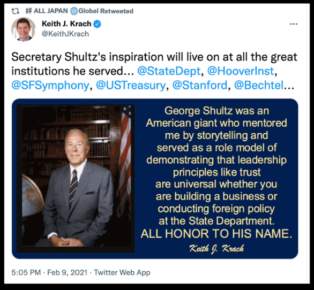 Krach closed his commencement address with a quote from former Secretary of State George Shultz, who died last year. “December 13th marks my turning 100 years young,” Shultz wrote. “I’ve learned much over that time, but looking back, I’m struck that there is one lesson I learned early and then relearned over and over: Trust is the coin of the realm. When trust was in the room, whatever room that was—the family room, the schoolroom, the locker room, the office room, the government room, or the military room—good things happened. When trust was not in the room, good things did not happen. Everything else is details.”
Krach closed his commencement address with a quote from former Secretary of State George Shultz, who died last year. “December 13th marks my turning 100 years young,” Shultz wrote. “I’ve learned much over that time, but looking back, I’m struck that there is one lesson I learned early and then relearned over and over: Trust is the coin of the realm. When trust was in the room, whatever room that was—the family room, the schoolroom, the locker room, the office room, the government room, or the military room—good things happened. When trust was not in the room, good things did not happen. Everything else is details.”
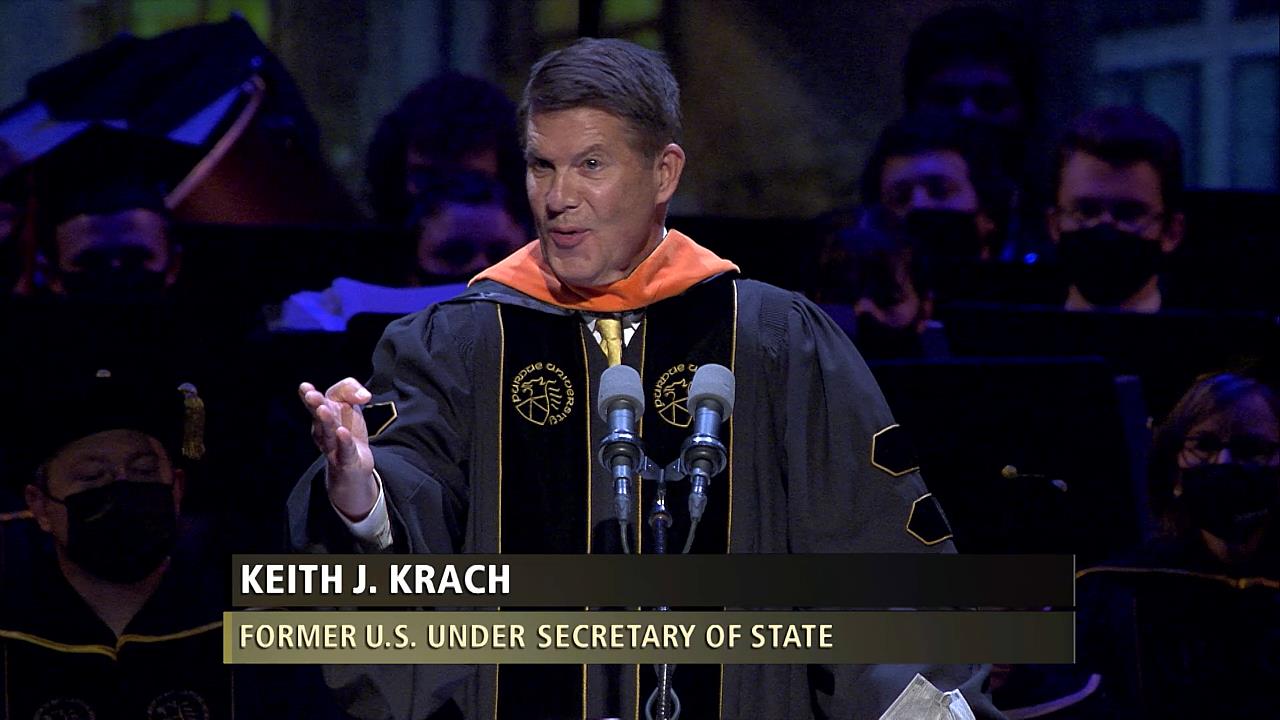
Krach reflected that he now understands that the simple T2equation he unknowingly learned at Purdue is really a magic formula for making a difference in this world. “A big difference, a little difference, but most of all a meaningful difference,” he said.
“So, what does Transformation to the power of Trust, equal?” he asked the graduates. “It equals all things are possible, or Infinity to the power of Infinity,” which his old engineering professor said “is the biggest number in the world.”
View the speech here.
Read the speech transcript here.
This article is part of a four article series:
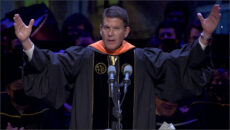
Krach Delivers Powerful Purdue Commencement Address with Proof of Equation: Transformation to the Power of Trust
Krach tells grads, “The world needs more trusted transformational leaders than ever before,” in inspiring commencement address.
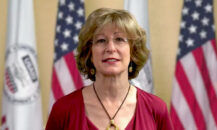
Purdue Forms World’s First Institute for Tech Diplomacy Through Transformation and Trust
Krach, Glick, and Mung Continue Their Transformational Mission of Advancing Freedom through Trusted Technology
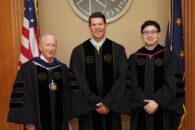
President Daniels Stands Up for Chinese Student and Human Dignity
Answers Krach’s Call for Safeguarding Academic Freedom
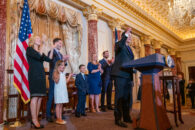
Trust and Diversity of Thought is the Catalyst for Transformational Genius
“If You Want a Friend in Washington, Get a Dog.”
Krach Did Something Better…




